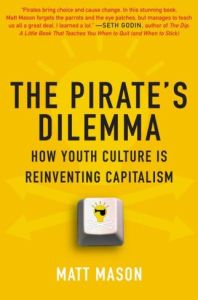Join getAbstract to access the summary!

Join getAbstract to access the summary!
Matt Mason
The Pirate's Dilemma
How Youth Culture Is Reinventing Capitalism
Free Press, 2008
What's inside?
Pirates take art, music and film, remix it, reinterpret it, and emerge with something new, edgy and, well, stolen.
Recommendation
You’ve been sleeping through an earthquake if you haven’t noticed teenagers freely creating and sharing digital music, photos and videos through the Internet. This is just one example of young pirates blurring the boundaries between ownership and invention, and rebelliously creating new innovations that ultimately transform society and the commercial marketplace. In a book that is both hipster and academic, author Matt Mason makes the case that idea pirates and other rebels who draw from pop culture to create new forms (thus often defying intellectual property laws) can, and often do, benefit society. Mason surveys the landscape for piracy and finds it everywhere, from music remixing to viral hip-hop videos. Although he sometimes slips into the youthful delusion that creativity began with his own generation, Mason does highlight an important point: pirate innovations can help steer society’s course. getAbstract recommends this book to C-level executives seeking to understand changes in the competitive landscape, creative marketers who want to think outside the box and anyone interested in the underground’s influence on mainstream culture.
Summary
About the Author
Former pirate radio DJ Matt Mason is co-founder of WEdia, a Web media portal highlighting worldwide, nonprofit efforts. He was founding editor-in-chief of the alternative music magazine RWD, which created the satiric viral hit, “The Booo Krooo.”


















Comment on this summary